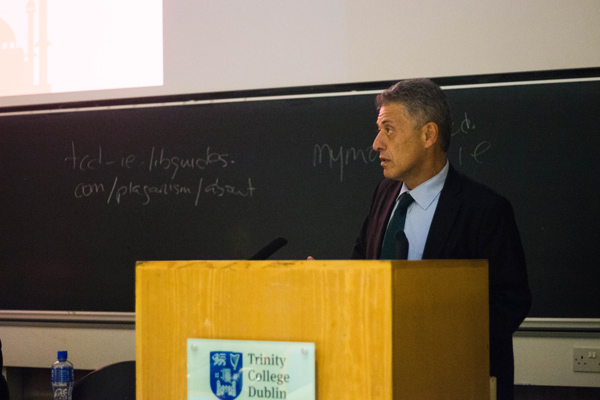
This evening at 7 pm in the Davis Lecture hall in the Arts Block, SOFIA members gathered to hear the opinions of His Excellency, Levent Murat Burham, on Turkish Foreign Policy. Previous to his ambassadorship here in Ireland, Burham had also worked in Somalia, Russia and with the UN. Burham also visited the college last February and remembered the last discussion fondly before introducing his topics for the evening ahead.
Turkey is the sixth most represented country in the world, with 135 embassies all over the world. Burham talked us through the various “main elements” of turkish foreign policy. These included the stability of the various surrounding regions, a desire to “open up to new geographies” and solidify Turkey’s various “strategic relationships” with influential powers. Since the end of the Cold War there have been “a lot of changes” to Turkish foreign policy. The most significant changes have regarded the various “balance of power relationships” with other countries as well as the “threat perceptions”. Turkey “must now rely on international intervention” to tackle any political threats. This weakens Turkey’s position as it must now rely on other countries for support to defend its own issues. As a solution to this Burham said that “it is a strategic goal to become a full member of the EU by 2030”.
Highlighting how Turkey differs from most other countries, especially those within the EU, Burham pointed out that an “important aspect of Turkish foreign policy is its humanitarian diplomacy”. With over 3.5 million refugees, 3.1 million of whom are Syrian alone, Turkey is the second biggest aid provider in the world. All refugees in the country are provided with “food, education, health for free”. Burham, acknowledges that this is of course a “huge burden on Turkish budget”. Nonetheless the country is eager to further its humanitarian impact, after it organised the first humanitarian summit in Istanbul last year. The summit was not only attended by governmental organisations, but also by NGOs, academics and aid organisations.
Acknowledging its geographical location as being the “cross-roads of different continents and different communities”, Burham admits that Turkey is constantly “affected by what is going on around us”. The troubles in the Middle East have become “more purtinent” in recent years. Their attempts to tackle this include an Initiative that Turkey co-founded with the US called the Global Counter-Terrorism Forum.
Regarding the prospect of EU membership His Excellency joked that Turkey had been trying to gain membership in the EU since the year he was born. Discussions began in 1959 and since then, he believes “we are not advancing” as quickly as he would like. But he is “hopeful” that their goal may be reached by 2030. It is a “strategic target” of Turkey to “adopt western values” and establish a “project of modernisation”.
Turkey’s relationship with Germany was brought to light during the discussion when questions were opened to the floor. In his response the Ambassador referred to the “attempt to overthrow the constitutionally elected government” by Turkish pilots on July 15th of last year, the result of which caused 130,000 civil servants to lose their jobs, which was the reason for Germany’s anger at Turkey. Defending that decision, Burham insisted that the members of the organisation who had arranged the attacks on parliament and the presidential palace “were everywhere”. But he assured us that there were enough “legal remedies” in Turkey, which have been approved by the UN, to deal with the matter. Since then 34,000 people have been returned to work.
Overall the discussion was considered to be beneficial by all who attended, with one attendee noting “it was interesting to hear the official perspective” on events. The discussion ended with a few light hearted questions regarding the ambassadors favourite hobby ( travelling) and where he would most like to go next, to which he responded “My next target is Iceland”.






